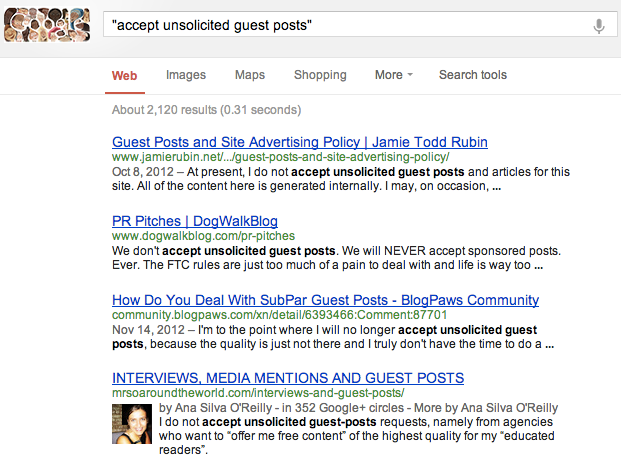The world of link building is rapidly changing thanks to Google algorithms. Along with the loss of article marketing, blog networks, and other link strategies, the question remains: is link building through guest blogging on its way out too?
The first piece of evidence to consider is the video by Matt Cutts, head of Google’s Webspam team.
The second is the number of blogs that are closing their doors to guest post submissions.

The reason the doors are closing and Google is considering scrutinizing guest blogging? Abuse by marketers, plain and simple. So how can you still benefit from guest blogging? Here are some best practices.
Create Valuable, Unique Content to Submit
Google has nothing against quality guest blogging, but they do have something against any form of spammy link building technique. If you submit low-quality duplicate content as a guest post, then this is the kind of guest blogging that Google may later discount in your link profile.
So the first thing you can do to ensure the best possible results in guest blogging is create valuable, unique content to submit as guest posts. If you can’t create the content in-house, consider hiring professional freelance writers to create the content for you. Note that you get the content you pay for, so if you pay a cheap rate for content, you’ll get cheap content.
Seek Out High Quality Blogs
If you see that a blog is covered with ads, links, and low-quality content, you likely do not want your content or link on that blog. It’s easy to tell when you have found a blog with good content vs. a blog that may be getting paid to publish anything for a link. Just because it has good PageRank does not mean ti is a good site to focus your guest blogging efforts towards.
Target Blogs with Traffic & Engagement
One way to ensure that you don’t submit your content to a low-quality blog is to aim for blogs that have a decent amount of traffic and social engagement in the form of social shares and comments. If you aim to place your quality content on blogs with the goal of reaching people instead of building links, you will not only build links, but you’ll gain click throughs to your websites (or your clients’) leading to a better ROI.
Get to Know the Blog First
If you’re running into a lot of problems with getting your content accepted, and you know your content is good, then you need to slow down and get to know your target blogs first. Evaluate the types of posts they generally publish by quickly glancing through their RSS feed – subscribe in Google Reader so you can just scan the titles.
Next, let the blog owner become familiar with you by interacting with their blog through commenting and social sharing. Once the blogger recognizes you as a regular member of their community, you are much more likely to receive a positive response about your guest post submission.
Get an Introduction
If you are targeting a larger blog with multiple writers, then you might want to go by the way of an introduction. See if you know any of the other writers on the blog and ask them if they can introduce you to the blog owner or editor. This way you can bypass the general submission form that probably receives a flood of inquires every day and get right into the main editor’s inbox. This will increase your chance of getting published in a timely manner. Otherwise, even if your submission is accepted, it will be thrown into a queue that could take weeks or even months to publish.
Customize Your Author Bio
If you are using the same author bio from one site to the next, you may want to reconsider. Take a look through your target blog and see if you can match your author bio to those of previously published authors. Also be sure to vary your anchor text. If it’s a blog with a high volume of traffic, consider creating anchor text that lures readers into clicking on the link as this can be more valuable to your business than just trying to up your keyword rankings.
Create a Portfolio
Blog owner and editors want to see a list of your past accomplishments. Each time you have a successful guest post, add it to your portfolio. You can create a writing portfolio easily on your own blog or website. As an added bonus, your regular readers and visitors may be impressed by the fact that you are writing for so many other sites in your industry. Having a strong writing portfolio can be a huge reputation booster!
Be a Great Guest Blogger
Last, but not least, be a great guest blogger. Promote your post through your social networks, reply to comments on your post, and follow up with the blog owner / editor to see if they have any feedback, positive or otherwise. The latter can help you improve your guest blogging technique so that you have even more success as you submit to larger, more authoritative blogs.
What tips do you have for using the guest blogging strategy in 2013 to build links? Please share in the comments!

 Site Explorer
Site Explorer Keyword tool
Keyword tool Google Algorithm Changes
Google Algorithm Changes

Leave a Reply!